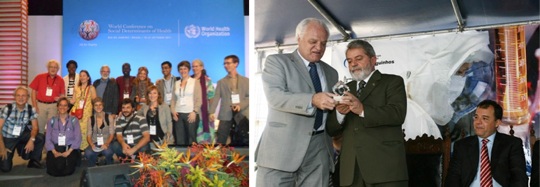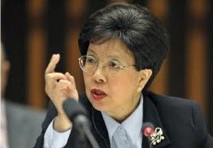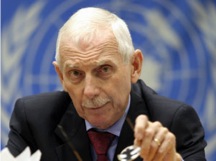Determinants of disease, health and well-being
Rights, equity, justice: Rumpus in Rio

Who let the People's Health Movement (left) into the Rio WHO meeting? Enlightened Brazilians such as Paulo Buss (with ex-President Lula, right)
Our news team reports. We report on dramatic scenes in Rio de Janeiro. All who see that public health nutrition is a branch of public health will do well to study the products of the World Conference on the Social Determinants of Health. This was held in Rio between 19-21 October, immediately following the Valparaiso summit reported on in this issue. The conference revealed vivid and sharply polarised ideologies.
Interesting times
The expected division would have been between officials from UN agencies and national governments, on the one hand, and representatives of public interest civil society organisations and universities, on the other hand.
But this is not how things turned out. Certainly, the genuine civil society organisations, of which the People's Health Movement was the most vocal and effective, severely criticised and even denounced the official Political Declaration issued at the conference. As it turned out, their views were evidently recognised and respected by many official delegates from national governments and UN agencies. Indeed, key delegates, including those given time to speak who are quoted below, clearly sympathised with or agreed with the People's Health Movement position. Judging from what she said, quoted here, these include current WHO director-general Margaret Chan.
The official Declaration is a statement of good and worthy principles, but it identifies improvement of social and other inequities as largely a technical issue to be fixed by experts and with money. As pessimists predicted, the fire, energy and purpose of the 2008 report of the Commission on the Social Determinants of Health has been filleted out. Cynics believe that technocrats within the UN system encouraged the Rio conference as a way to neutralise uncomfortable aspects of the Commission's work. These go against what is now the utterly disgraced and discredited but still dominant 'free market' red in tooth and claw capitalism, which became known as 'the Washington Consensus', put in place beginning in the 1980s.
Return to Alma Ata
With remarkable enterprise and initiative, the People's Health Movement team, pictured above (left) with other colleagues from social movements, produced and circulated its unofficial Declaration. This identifies the true 'causes of the causes' of disease, health and well-being. These include the systematic and deliberate hollowing out of the South by the already wealthy countries of the North, and by the global financial, economic and trade organisations they control. Cynics pointed out that some senior people in government and the UN system may find future careers in 'the private sector', or working for the 'new philanthropies' or for US-based aid, trade or research organisations.
With great significance, the unofficial Declaration is signed by a large number of organisations. It is also signed by a large number of people, of whom the first is Halfdan Mahler who, when director-general of WHO from 1973 to 1988, enabled the Alma Ata Health For All Declaration.
Who let the PHM in?
Who accepted so many people from the People's Health Movement into the by-invitation-only conference? Why was Association member David Sanders, whose views are well-known, given a key position in the programme as a final commentator on the conference and its significance and failures? Was this the decision of the head of the WHO conference secretariat Rüdiger Krech, whose WHO post is as head of Ethics, Equity, Trade and Human Rights? Perhaps not: he is understood to be a devotee of public-private partnerships, which involve being nice to transnational industry and global finance and trade organisations. It seems more likely that the decision was taken by the local Brazilian host and mastermind Paulo Buss. Seen right in the picture above, with previous Brazilian president Luis Inacio 'Lula' da Silva, he is the dynamic and charismatic former president of the progressive Oswaldo Cruz (Fiocruz) foundation in Rio. This is the branch of the Brazilian health ministry responsible for public health, which is now taking a special interest in public health nutrition.
Extracts from some of the more significant statements made at the Rio conference follow. Some editing for clarity as well as length has been done.

Margaret Chan
Director-general, World Health Organization
Margaret Chan opened the conference. Here follows a shortened version of her address. Hers is a progressive and even radical voice within her own organisation. One of her points is that public health, including population food and nutrition adequacy, security and equity, is a political issue. She began by stressing the need for strong and persistent civil society organisations, vital to any responsive democracy. She has said on other occasions that the current dominant systems of political and economic governance have failed.
Brazil is the ideal place to host the first event of this kind. This country has long enjoyed a strong civil society movement pushing for health reforms and health equity. These reforms have recognised health as more than a biomedical entity.
Improvements in key indicators of health in any country are the proof of what can be achieved when social equity is embedded in minds and policies. As we open this conference, lives hang in the balance. Lives cut short because the right policies are not in place. Social cohesion, stability and security are at stake, in individual nations and internationally.
Governments have responsibility towards people and their health. But people are pushed into poverty due to catastrophic medical bills, and many governments are not preventing this. Progress in a civilised world should mean more than simply making more and more money.
Globalisation was set to be the rising tide that would lift all boats, but this never happened. It lifted the big boats, but sunk many of the small ones. Globalisation creates benefits, sometimes big ones, but has no rules that ensure the distribution of those benefits.
Things are getting worse
The world now is highly interconnected, but the goal right now is to fulfil the economic benefits and not to distribute them fairly or evenly. As a result differences in income, access to care, and health outcomes, are greater today than in any time in history. As a consequence, the world is not safe or secure.
This year of 2011 is a year that has witnessed many disasters and social turmoil, but also two very important events. The first one is the Middle East uprising demanding democratic reforms and human rights, which include the right to health. This uprising has been at times inspiring and at times worrying.
Just as with the financial crisis in 2008, these protests seemed to be a surprise. But there are root causes that make them understandable and even predictable. These include inequality in income and access to services. Greater social equity must be the new political and economic imperative for a safer world. Health services have to be delivered according to the values, principles and practices of primary health care.
A second key event in 2011 has been the High-Level Meeting on non-communicable diseases, held during the UN General Assembly last month in September. These diseases are driven by powerful universal forces, like rapid urbanisation and the globalisation of unhealthy lifestyles. They undermine development and growth, they break the bank.
Studies estimate that in the next 20 years these diseases will cost the global economy more than $US 30 trillion. The majority of the costs for the care of these diseases are met through out-of-pocket payments, which lead people into poverty. Therefore these diseases are a two-punch blow to development: loss of national income and an increase in the number of poor people.
The junk food menace
Prevention is by far the best option, and it is entirely feasible and affordable in any resource setting. But nearly all the risk factors lie out of the control of the health sector. These include junk food, tobacco, alcohol and sedentary lives. Prevention measures lie as well outside the health sector, and public health loses power in this fight. We need the right policies in place in all sectors of government.
Vast collateral damage to health is being caused by policies made in other sectors and in the international system. Good policies are known and well studied, but putting them in place is an enormous challenge. It means pushing against powerful and pervasive commercial interests.
Every corner of the world is fighting against obesity and overweight, which is rising particularly in children. This is not a failure of individual willpower, but a failure of political will at the highest level. Kids in the whole world watch cartoon characters who tell them what to eat and drink. Two weeks ago, France passed a 'fat tax' on sugary drinks, and was immediately threatened by a company producing such drinks. It is very hard for any country to bear the financial burden of this kind of litigation, especially for small countries.
These are some of the forces undermining health that are being addressed in this conference. Will governments now put the health of people before the health of corporations? We know enough to act and we have extremely good reasons to do so, including economic ones. We need to change the rules of this world and to implement policies that work. We need greater social cohesion, security and stability. This is the price worth fighting for in health and in multiple other sectors.
Thank you Brazil for hosting this conference and for your example.
The above is extracted from Margaret Chan's opening statement. The sections that follow are also edited versions of what other key speakers said.

Ilona Kickbusch
Director, Global Health Programme, Graduate Institute
of International and Development Studies, Geneva
Like other speakers Ilona Kickbusch, whose distinguished career has included work as a WHO executive in the European region, emphasised that health is a political issue. Her contribution, very abbreviated here, places public health nutrition as a branch of public health, and public health itself as part of a broad political and social agenda, now needing to be given top priority in global, international and national governance. She also pointed to the divisions between and within UN agencies and governments, vividly apparent at the conference.
We are at a turning point in terms of our health services, and we have to change. We are talking not about a technical challenge but a truly political challenge. The medical historian George Rosen did very important analysis on what distinguishes a health from a public health agenda. There are always two streams, the medical and technical one, and the socio-economic and political one
In the 19th century we had the establishment of public health systems. These systems responded to the social and economic environment that had been created. Then health systems were established, at least in the North of the world.
We have now to reconsider the notion of what is a health system, we need a new framework for intersectoral action. Public health and health care streams have to be taken together. When there is a big push for change, many issues come together: globalisation, technology, social change, and particularly politics and economics.
If we examine how we organise our health systems and want to provide universal access we are talking about what kind of society we want. Too frequently we address the issue as if it was a technical discussion based on evidence. But basically it's a political decision about how we want our society to be.
Public goods are central
We need to be much clearer when we talk about universal access, that this is a new type of discussion and conflict. Also, health has become critical to many economies, occupying 10-15 per cent of national product, and 10-15 per cent of populations work in the health sector. This of course has a great impact when cuts are made.
Our reasoning needs to be about the meaning of a good life and the policy of common goods. The notion of universal access to health systems is linked with solidarity and to democracy. If we are now changing our economic mindset we cannot keep staring at Gross National Products. We need to look at other dimensions. This will impact how we shape health policies in relation to justice and common good. Human health and well-being are key features of any fair inclusive society. This implies a set of values. Unless we acknowledge this, together with the conflicts implied, we will not do anything.
Politics and medicine
Let me quote Rudolf Virchow who, in the mid 19th century, fully understanding the political dimension of health, became a parliamentarian to fight for public health. He said: 'Medicine is a social science and politics is nothing but medicine on a large scale. Medicine as a social science, as the science of human beings, has the obligation to point out problems and to attempt their theoretical solution; the politician, the practical anthropologist, must find the means for their actual solution'.

Margaret Chan
Director-general, World Health Organization
In this intervention, here abbreviated, Margaret Chan spoke as a Chinese citizen, with remarkable candour. She came close to quoting the great German epidemiologist Rudolf Virchow, who said: 'Epidemics are great warning signs against which the quality of civilisations can be judged'.
Health is always political. If we look at it as a technical subject we miss a lot of it. There are always crises. These crises drive changes. They always go back to the same principles: social justice, social protection, fairness, redistribution.
States of health are a barometer. States of ill-health tell us that something is wrong. In the case of China, before the opening up, health for all was a fundamental principle, under the communist government. When China opened up and moved towards a social system with Chinese characteristics, it also introduced the market system. The Chinese authorities took advice from the global financial institutions, and what they cut was health and education.
The loss of equity in China
China is a great success in terms of economic growth, but now health and education have to be reformed and the government is now clear on this. Before the opening up, health was equitable and accessible. Then it moved on a fee for service model, driving people into poverty. People say it's difficult to see a doctor and extremely costly as well, people are unhappy and angry and that has pushed health reforms.
Now there are multiple mechanisms in place, including social insurance. Universal coverage is so important because it's going back to the basic principle of social protection, social justice and fair distribution. Health is political.

Maria Guzenina-Richardson
Minister of Health, Finland
As often with politicians from Nordic countries, Maria Guzenina-Richardson made a clear statement of the need for welfare states. She gave herself as an example. She also emphasised that the still-dominant political and economic ideology spawned by Milton Friedman and the Chicago School of economics is now proved to have failed in its own terms, as outlined by Naomi Klein in her book The Shock Doctrine.
Finland is considered a welfare state. I am a living example of what a welfare state can produce. I was born from an ignorant woman from Russia in 1969. My father left soon after. Due to the welfare state and the health care system I could survive, access education, get free meals every day. I am now a proud minister and a proud woman, because in Finland gender equality has always been a norm. I never had to fight for my positions.
I am a true believer in the welfare state, but even in Finland now we are facing trouble. People want to make business on people's health and this is likely to prevent access for poor people to health services. When we faced the recession in 1990s the government tried to reduce the economic losses, but forgot to take care of the people.
The 'free market' is a systematic failure
Our welfare state was not created in a moment and out of nothing. It needed a lot of determination and political commitment. We have understood that the welfare state is the way to fight inequalities.
Times are changing in Finland as well, and we are also influenced by the European Union as well. The Chicago School of economic theory was wrong and we are now paying the price. We have enough history to show us that, and also to show us what works.

William Lacy Swing
Director-general, International Organisation for Migration
(An intergovernmental organisation founded in 1951)
William Lacy Swing pointed out the omission from the official Political Declaration of just one crucial vast human group – migrants, for which he is responsible in his post. His example is one of many that were given at the conference.
I am disappointed with one aspect of the Rio Declaration. There is no mention of migration and migrants. You talk about equity, disaggregated statistics, and you mention some groups that need to be mentioned, such as indigenous people. But migration is itself a social determinant of health. There are more people on the move today than in any time of recorded history.
Migrants must be protected
I am not surprised that migrants don't appear. They were not in the Millennium Development Goals, they were not in the UN documents on climate change, they are not reported in the 2008 WHO report on the social determinants of health. But the very composition of nation states is changing before our eyes. If we continue to exclude migrants from health information and health services we will continue to have unhealthy migrants among healthy communities. We know what that means.
At a time where so many people are on the move, we also have a very strong and increasing anti-migrant movement. Our responsible leaders should be doing more to inform and educate our public to the overwhelmingly positive contribution that migrants make around the world. Since the 1960s, there has been a feminisation of migration – 49 per cent today). This involves empowerment of women, but it is also exposing them to great vulnerability along the migration routes. It is important to increase the dialogue among countries of origin and countries of destination. Migration policies should be coordinated to ensure protection of the rights of migrants.

David Sanders
University of the Western Cape, South Africa
Speaking from the People's Health Movement
These interventions received a standing ovation. This came not only from genuine civil society representatives present. As the applause continued, more and more politicians, civil servants and UN representatives also rose to their feet, demonstrating the divide between them and the officials who remained sitting, hands in laps. Association member David Sanders was the conscience of the conference.
I want to focus on mothers and children in particular. There is an unacceptable gap between rich and poor. A woman in a poor country has a one in ten chance of dying in childbirth. A total of 35 per cent of deaths of children in the world are due to malnutrition.
Big Snack immiserates populations and causes obesity
What are we doing about this? Very little. Trade is sadly not mentioned in the Rio Declaration. Undernutrition is related to free trade agreements. Northern countries subsidise their agriculture and export food to impoverished countries, flooding their markets. For example, Japan subsidises its dairy industry to the tune of $US 2,600 a year per cow. Why should a Japanese cow enjoy an annual 'income' of five times that of an African citizen who earns on average $US 500 a year? And this leads to food insecurity. Why are we not talking about these things?
What is UNICEF doing about this? It is flying Plumpy'nut™ from France into Africa to treat malnutrition. This medicalises the problem and draws attention away from the fact that African countries import food and sell land to transnational food companies. Ethopia, the largest recipient of Plumpy'nut, also receives 700,000 tonnes of food aid a year. It has just sold 3 million hectares of prime land to a food transnational corporation.
This is the context of the problem and we are not addressing it. Looking at non-communicable diseases, again trade is the issue. South Africa is the third fattest country in the world; and the importation and production of processed food products, and of whey, an ingredient of snacks, has gone up exponentially. How are we going to control malnutrition without regulating trade?
Also, there is no reference in the Rio Declaration to the unfair trade of health personnel. Africa and Asia have been stripped of health personnel and that is very unequal trade, contributing to an increase in maternal mortality among other things, since skilled health personnel are crucial to reducing this tragedy.
It was estimated several years ago by UNCTAD (the UN Conference on Trade and Development) that the US saves $US 184,000 in training costs for each imported professional. Totalled up, this translates into hundreds of billions of dollars. Again here is the South subsidising the North. We need compensation for what African ministers of health a few years ago called brain robbery – not a voluntary code, like the present WHO code on recruitment, which has no teeth to enforce it.
The new philanthropies and the food crisis
I am also member of the People's Health Movement, a global movement active in about 70 countries, with several affiliated organisations. We have a position in PHM of unconditional but critical support of the UN agencies. Although they are imperfect, they represent the views of the member states. However, they have been weakened substantially because countries are not funding them as they should. They should also be strengthened and they should be bolder. But private initiatives such as the Gates Foundation are major funders and they are influencing these agencies to a great extent.
As Bob Dylan said, money doesn't talk, it swears. We need to speak about the financial crisis, a food crisis and a climate crisis (and climate is not mentioned in the Rio Declaration). The financial crisis is a crisis of capitalism. There is an alternative Rio Declaration put up by civil society, with ten very clear demands, including a Tobin tax. Why aren't United Nations agencies calling for this? This is not a radical thing, it's a tax on the casino economy. Now poor people everywhere, including in SoutherN Europe, are paying for the crisis. We should stand up for them.
Box 1
Social determinants of health:
Many words. Many actions?

Michael Marmot
Chair, WHO Commission on the Social Determinants of Health
This comment, a shortened version of which follows, was published in the Bulletin of the World Health Organization (2011; 89: 702). Michael Marmot has made the issue of the impact of class and other socio-economic factors on disease, health and well-being his life's work. In common with many others committed to the protection and improvement of public health, which includes population nutrition, he is believed to be extremely perturbed by the continued deterioration of public health and its services, increased inequity between and within countries, and lack of progress towards the goals set in the report of the commission he chaired. It is likely that he is sympathetic with the views forcefully expressed in Rio by David Sanders and other representatives of the People's Health Movement.
Closing the Gap in a Generation (1) is a rousing call. Did the World Health Organization's Commission on Social Determinants of Health really believe it to be possible? Technically, certainly. Yes, there is a greater than 40-year spread in life expectancy among countries and dramatic social gradients in health within countries.
But the evidence suggests that we can make great progress towards closing the health gap by improving, as the Commission put it, the conditions in which people are born, grow, live, work and age. These include: ensuring equity for every child from the start, healthier environments, fair employment and decent work, social protection across the life course, and universal health care.
To make such progress, we must also deal with inequity in power, money and resources – the social injustice that is killing on a grand scale. At a more fundamental level, our vision is to create the conditions in which every person may enjoy the freedoms that lead to improved health – what we call empowerment.
In the three years since Closing the Gap in a Generation was published, there is much to make us gloomy. The global financial crisis, and the steps put in place to deal with it, have worse impacts on the poor and relatively disadvantaged. There is persistence of bad governance, nationally and globally. There is climate change, and inequitable measures for mitigation and adaptation. And, in many countries, there is persistent increase in health inequity.
On the positive side, however, much has happened. At the World Health Organization (WHO) itself, the doubting voices ('what do social determinants have to do with a disease control organization?') were countered by the argument that WHO could not possibly ignore what the Commission called 'the causes of the causes' of ill-health.
A resolution was passed at the World Health Assembly in 2009 that called on WHO and all member states to take action. Each of the WHO Regions has expressed interest. Zsuzsanna Jakab, WHO Regional Director for Europe, has invited me to lead the European Review of Social Determinants and the Health Divide. Recommendations from this review will feed in to Europe's new public health strategy, Health 2020.
Several countries have explicitly taken on the social determinants of health agenda. Brazil, Denmark, England, Norway, Scotland and Slovenia are among many countries that have commissioned reviews and/or have produced strategies for action.
In other countries such as Argentina, Chile, Costa Rica and Sri Lanka, there is much focus on and concern about the social determinants of health. The state of South Australia has made the Health in All Policies approach a central plank of government action. India has pursued policy initiatives that will have important impact on health equity. These include: rural employment guarantees, food security, universal health care, social security for informal workers, education, housing and rights of tribal and forest dwellers.
These new policies and programmes are all welcome but the proof will come from monitoring their effect on social determinants and health outcomes.
The ambition of the Commission was to create a global movement for social determinants and health equity. As the global community gathers in Rio de Janeiro for the world conference on social determinants of health, we are at a crucial juncture.
Will the call for social justice and the need to formulate all policies to benefit health equity remain something, at best, honoured in speech alone? Or will the global community recognise that action on the social determinants of health is not only vital for health equity, but has other highly desirable societal outcomes including social cohesion, reduction of crime and civil unrest, a more educated workforce, and the freedom for people to lead lives they have reason to value?
Reference
1. Closing the Gap in a Generation: Health Equity Through Action on the Social Determinants of Health. Geneva: World Health Organization; 2008.
Acknowledgement
This news story has been made possible with the help of and information from Chiara Bodini, Ardigò Martino, Claudio Schuftan and Angelo Stefanini, and others who prefer not to be named, and most of all by the meticulous recordings and notes made of speeches at the conference by Chiara Bodini. The People's Health Movement team included those pictured at the beginning of this story. These are: (in front) Angelo Stefanini, Nancy Krieger, Chiara Bodini, Ardigò Martino, Ilaria Camplone, and (behind), David Legge, Falilatou Dogo, Anne-Emmanuelle Birn, Ronald Labonte, (unknown), Brigida Marta, (unknown), Corinna Heineke, Connie Gates, and Remco Van de Pas.






